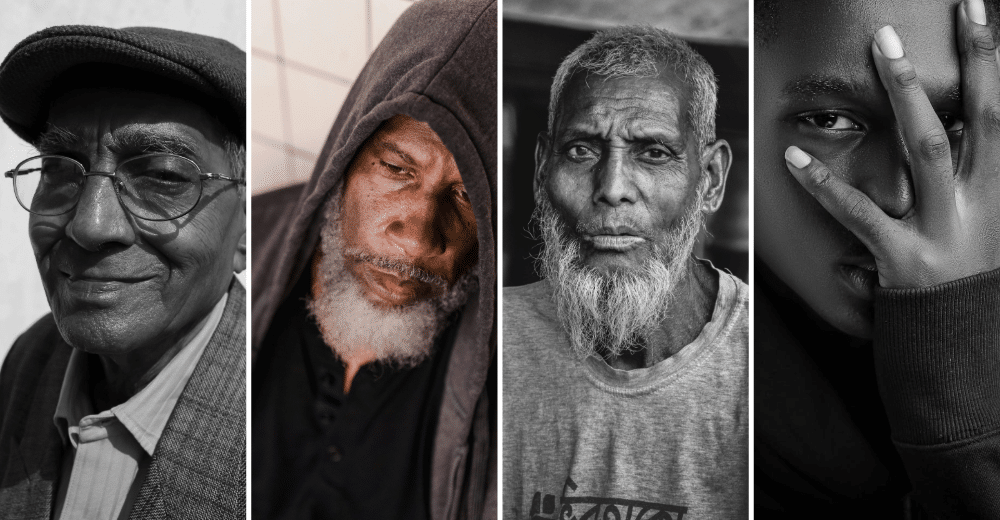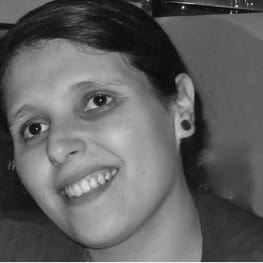
© Photo Credits | From left to right: Pexels / Photographers: Harshi Rateria, Timur Weber, Tarikul Raana, Juste Buka

Dr. Saloua BERDAI CHAOUNI, a Postdoctoral Researcher at the Society and Ageing Research Lab (SARLab) from Vrije Universiteit Brussel (VUB), authored this publication in recognition of the International Day Against Racism, observed on March 21, 2025.
Europe’s population is aging, and with it, an increasing number of older adults come from diverse ethnic and cultural backgrounds. This demographic shift is rooted in post-World War II migration histories, shaping the fabric of many European societies, including Belgium, the heart of Europe. However, on this International Day Against Racism, there remains a glaring blind spot in research and policymaking: the impact of racism on these aging Europeans. What is for example the impact of life span encountered racism on their health and well-being? This is a gap that I seek to address as a researcher, but one that requires collective urgent attention and action.
The Unseen Burden of Racism on Health
The link between racism and health disparities is increasingly recognized but remains underexplored, particularly in Europe (The Lancet, 2024). While the significance of social and environmental determinants of health has gained acceptance in recent years, racism as a public health determinant is still underdeveloped and underrecognized. A turning point occurred in 2020 when The Lancet declared racism a “public health emergency of global concern.” This statement was followed by special issues highlighting racism as a structural, historically rooted system of oppression ingrained in institutions, research, and everyday life (The Lancet, 2022). Racism manifests in many forms, from microaggressions to systemic and societal violence, all of which contribute to severe health consequences. Emerging research, primarily from the United States, underscores that racism leads to both mental health conditions (e.g., depression, anxiety, PTSD) and physical illnesses (e.g., hypertension, diabetes) through chronic psychological and physiological stress. Alarmingly, racism has even been linked to accelerated aging, or ‘Weathering’. For example, American researchers established the direct impact of racism on brain health resulting in brain changes associated with Alzheimer’s Disease.
A European Research Deficit
Despite increasing evidence of racism’s impact on health and the ambition to address it (EU Commission, 2020), Europe lags in addressing this issue (EU Commission, 2024). This is particularly concerning given the recent rise in reported racism: according to the European Union Agency for Fundamental Rights, between 2016 and 2022, experiences of racism increased from 39% to 45% among Black Europeans and reached 47% among Muslim Europeans with migrant backgrounds. Moreover, racialized migrants face systemic racism throughout their lives—in education, employment, housing, and healthcare—yet research remains fragmented (FRA, 2023; 2024). This fragmentation is also evident in the European Commission’s separate vague targets regarding racial health inequalities and reduction of the broader health impact of racism to the effects of racial trauma on mental health (EU Commission, 2020, 2024).
There is a pressing need to understand how sustained exposure to racism shapes health and resilience throughout different life stages. A life-course perspective that centralizes the intersectional lived experiences of racialized older adults is essential for gaining deeper insights that inform policies effectively. This requires space for innovative research approaches that strive for epistemic justice, ensuring that inequities are not reproduced—especially primordial when studying this topic and engaging individuals in racialized positions.
Europe’s Responsibility in the Face of Global Setbacks
Historically, the U.S. has led research on the impact of racism on health. However, at a time when equity-driven policies and research are under attack in the U.S., Europe must be at the forefront to fulfill its commitment to being a union of equity (EU Commission, 2024). European institutions and policymakers should invest in research and policies that promote a more just and equitable society—particularly for racialized older adults who have to face intersections of exclusionary mechanisms, including ageism and racism. This calls for continued efforts to mobilize EU research funding and enhance research awareness and expertise (EU Commission, 2021, 2024). These efforts must include a deeper integration of the intersectional lens, a strong commitment to epistemic justice, and the adoption of innovative methodological approaches. Research must move beyond fragmented analyses and center the lived experiences of those affected by racism in all its complexities, ensuring their voices shape both knowledge production and policy development.
Addressing this blind spot is not just an academic necessity—it is a moral and public health imperative that will contribute to a more just society for all. As Europe’s diversity continues to grow, so does its responsibility to ensure that all older adults, regardless of their skin color or ethnic-cultural background, can age with dignity, free from the lasting harms of racism. The time to act is now.
Author:
- Dr. Saloua BERDAI CHAOUNI, a Postdoctoral Researcher at the Society and Ageing Research Lab (SARLab) from Vrije Universiteit Brussel (VUB) , authored this publication in recognition of the International Day Against Racism, observed on March 21, 2025.
References
- European Commission (2020) A Union of equality: EU anti-racism action plan 2020-2025
- European Commission (2021): Guidance note on the collection and use of equality data based on racial or ethnic origin.
- European Commission (2024): Report on the implementation of the EU anti-racism action plan 2020-2025 and on national action plans against racism and discrimination
- European Union Agency for Fundamental Rights (Red.). (2023). Being black in the EU: Experiences of people of African descent. Publications Office.
- European Union Agency for Fundamental Rights. (2024). Being Muslim in the EU: Experiences of Muslims: EU Survey on immigrants and descendants of immigrants. Publications Office.
- The Lancet. (2022). Advancing racial and ethnic equity in health. The Lancet, 400(10368), 2007.
- The Lancet (2024). How to address migrant health inequity in Europe. The Lancet Regional Health – Europe, 41






